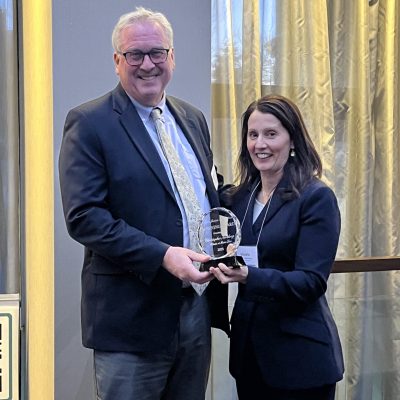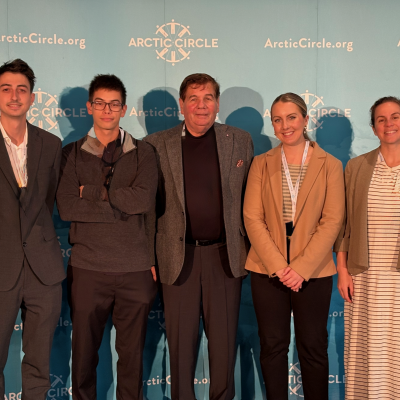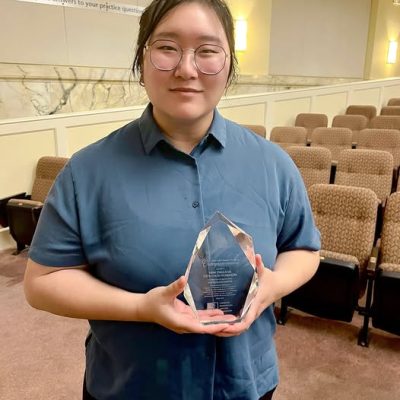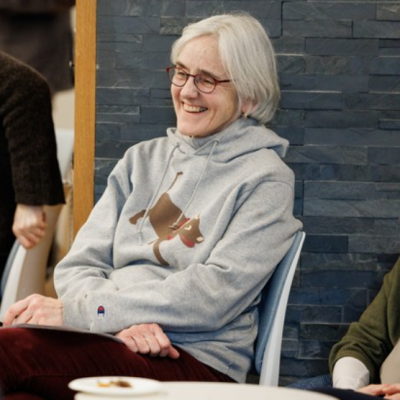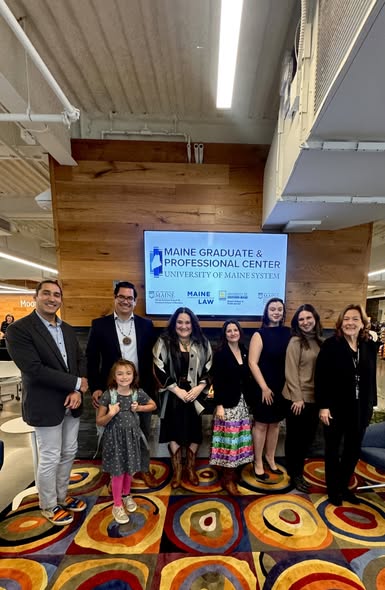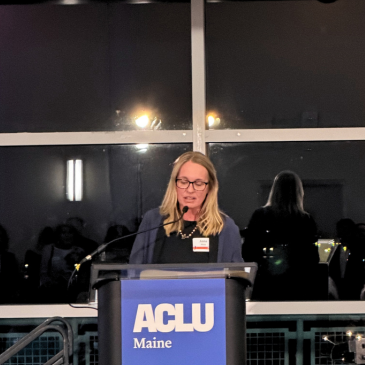Success Borne of Necessity
The University of Maine School of Law is at the forefront of education for the field of Information Privacy Law. But how does a small, tight-knit law school develop a Tier 1 program and attract speakers and teachers from the uppermost echelons of the Information Privacy world? The answer is simple: It’s a small, tight-knit law school. Maine Law has always relied upon its close, strong community and alumni relationships to fuel and sustain it — after all, a university is no more than the people who attend it, run it, and care for it.
As Mark Sayre ‘24 puts it, “One of the strongest aspects of the program is its supportive alumni network, which provides unique opportunities for mentorship and development.” Information privacy is the reason Sayre came to Maine Law. Prior to law school, Sayre spent time in-house at a tech start-up focused on underwriting algorithms. There, he was exposed to the world of data brokers, and specifically the use of data in Artificial Intelligence (AI). He began to get involved in discussions with regulators on data and AI governance and found a new focus for his career, one he felt necessitated a law degree — specifically, one with a renowned Information Privacy program and remarkably supportive alumni.
Maine Law graduates work on information privacy at law firms in Portland, Maine and around the world. The school’s strong alumni network connects students to unparalleled experiential learning opportunities. For those students, theirs is a passion for impact — making the most of the opportunities, and sharing their successes with others. For no alumnus is that more true than J. Trevor Hughes.
Keeping information privacy close to Maine
The history of Maine Law’s privacy program begins with J. Trevor Hughes, Maine Law class of 1995, now President and CEO of the International Association of Privacy Professionals (IAPP). Hughes entered the professional privacy law world during its early years while working as corporate counsel at the insurance company Unum. When the company bought its first domain name in 1995, Hughes became the de facto lawyer for the website. He quickly became immersed in internet law, electronic signatures, online contracting, domain name disputes, and, specifically, online privacy. Over the next decade and a half, Hughes worked as the Executive Director for both the Network Advertising Initiative (NAI) and IAPP, working out of his home in York, Maine. Today, Hughes is President and CEO of IAPP — whose headquarters is in Portsmouth, New Hampshire, an easy 45-minute commute from Maine Law. Today, Maine Law enjoys unparalleled access and connection to the largest and most comprehensive information privacy community in the world.
Maine Law’s connection and proximity to IAPP is, as both students and professors attest, invaluable. Beyond IAPP’s fellowship program, which grants selected students unparalleled access to and experience with the largest information privacy association in the world, Hughes and his association bring students to international conferences and connect them with alumni who are spread out across the professional privacy world. As Hughes puts it, “Maine law is punching way above its weight class when it comes to a reputation in information privacy law.”
The opportunities from the school’s connections are substantial. Last spring, Deirdre Sullivan ‘24 was granted funding to attend an IAPP conference where she was introduced to leading privacy professionals. Sullivan credits Maine Law’s size and close community to its success. She notes that, as a smaller institution, Maine Law can turn on a dime to adapt to the ever-changing future of information privacy. But the small size has other advantages. Sullivan says that professors really know what’s going on with their students. She explains, “They have the bandwidth to truly get to know you and your career and think about how to help you.”
The Summer Institute
Hughes began teaching courses at Maine Law as an adjunct professor with a vision of putting the school at the forefront of information privacy. Rita Heimes, General Counsel and Privacy Officer/DPO at IAPP, made that vision a reality. Heimes directs Maine Law’s annual Information Privacy Summer Institute, which is a series of summer courses on critical and current information privacy issues. The program attracts renowned movers and shakers in the information privacy space. Associate Professor Scott Bloomberg, who directs Maine Law’s Information Privacy Law Certificate Program, describes the quality of instructors in the summer curriculum as “astounding.” This past summer, they included Ryan Kriger (Attorney with the FTC), Justin Weiss ‘06 (Associate General Counsel for Naspers & Prosus), and Chinmayi Sharma (Associate Professor at Fordham Law School). And the summer program adds another dimension to Maine Law’s ability to constantly look to the future — topics that may not yet have a home in regular semester class offerings can find their way into classes taught by visiting summer professors, and eventually into Maine Law’s syllabus.
A Student-Founded Journal
It is difficult, at best, for students to break into and publish their work in most law school journals. At Maine Law, students saw a lack of an information privacy journal as an opportunity and started a blog as an outlet for students to publish their work on topics of Information Privacy Law, Cybersecurity Law, emerging technologies and legal implications of those technologies, and other related topics. The blog became so successful that it leveraged funding from the school to become a recognized journal, The Student Journal of Information Privacy Law (SJIPL). But the SJIPL stuck to its roots — it’s run by students and only publishes student work, making it unique in the world of law school journals. Bloomberg, who directs Maine Law’s Information Privacy Law Certificate Program, explains that acquiring a certificate requires substantial writing and publication, and he believes the journal is instrumental in offering that opportunity to students.
Hannah Babinski ‘24 is the journal’s Editor-in-Chief. Meanwhile Sullivan, the journal’s managing editor, helps 2L students select topics and helps edit their articles. Sullivan is also the Vice President of the Maine Law Privacy Association, a student club that works to bring privacy experts to speak at Maine Law. As Heimes puts it, “Maine Law students are curious and committed.”
Alumni, far and wide
Maine Law alumni are spread out across the information privacy world, from firms like Meta to CarGurus to the Network Advertising Initiative. Ginny Lee ‘05 leads Cisco’s new AI Governance program. She was one of Hughes’s first law clerks at the IAPP, and eventually one of his first
employees. Before her stint at Maine Law, Lee had an entire career as an engineer. She went to law school to become a patent attorney, but the connection between that practice and information privacy (which touched on her technology background) piqued her interest. She was, simply, fascinated — and she still is.
“Stay curious,” Lee says. That’s the advice she gives to those looking to enter the information privacy sphere. Lee takes time to mentor and advise new students and recent graduates, a common practice among Maine Law alumni.
Now, in her new role, Lee sees a similarity between the rise of information privacy and the advent of AI governance. So does Hughes.
Looking Ahead: You can’t spell privacy without AI
As Hughes tells it, the issue of privacy has been around since the dawn of humanity. Human beings care about privacy — we feel vulnerable in our lives. We want to have private conversations with loved ones so we can create trust and close bonds. New technology interferes with that desire for privacy. Whether it’s the printing press, the telephone, or ever-smaller cameras, every time technology interrupts our status quo, we have to sort things out again. That’s where privacy professionals come in — and it’s also where AI is changing our current landscape.
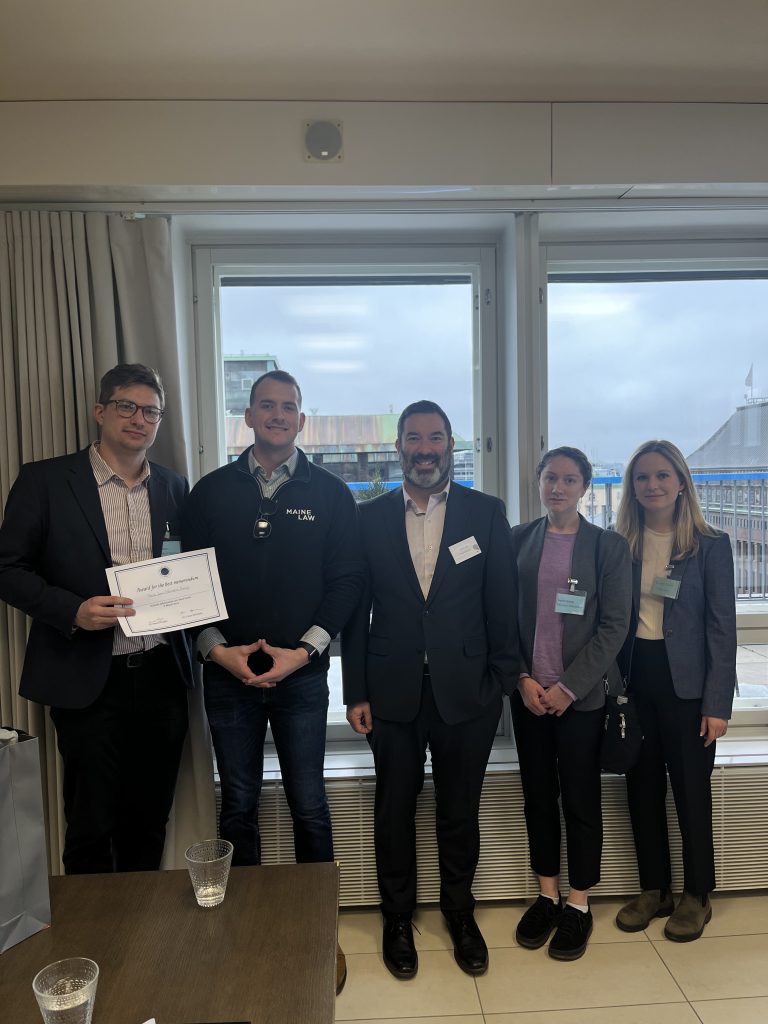
Hughes says that “over the last three decades, the rise of the digital world, the internet, and data-driven technologies have rapidly increased both the volume and velocity of those disruptions.” The advent of AI has sped up those disruptions exponentially. AI is already having a substantial effect on law, politics, journalism, academics, and the expertise of science, both beneficial and negative. Hughes says this has created a dire need for professionals who have the ability to put controls in place so that society can get the best out of AI — and mitigate the worst.
And in this rapidly changing space, the strength of Maine Law’s Information Privacy Program shines. The school’s ability to adapt quickly to new developments in the space, its investment and trust in its students, and its strong alumni network are all working in tandem to set up “curious and committed” scholars like Sayre and future generations of Maine Law graduates to make an immediate impact on our world.



